|
|
|
Sort Order |
|
|
|
Items / Page
|
|
|
|
|
|
|
| Srl | Item |
| 1 |
ID:
127334
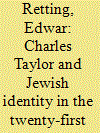

|
|
|
|
|
| Publication |
2013.
|
| Summary/Abstract |
The Jewish world is losing its ability to discuss its cultural differences. Our intra-Jewish dialogue is becoming less coherent. Indeed, the very ideas underlying our Jewish identities, ideas shaped by our language of values, are diverging. The language we use to describe our values is becoming more specific to the respective Jewish communities to which we belong, in Israel and in the Diaspora. We could be heading for a crisis.
|
|
|
|
|
|
|
|
|
|
|
|
|
|
|
|
| 2 |
ID:
127336
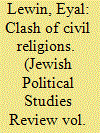

|
|
|
|
|
| Publication |
2013.
|
| Summary/Abstract |
Almost thirty-five years after Camp David and twenty years after the Oslo Accord, a fundamental question remains unanswered: does the majority of the Israeli public support a left-wing or right-wing ideology? The answer, in a democratic system, should be obvious, since elections are supposed to give a clear picture of the political preferences of the voting public. However, Israeli polls are misleading. After the Yom Kippur disaster in 1977, Menachem Begin won his premiership running as the hawkish leader who never would surrender even one grain of sand from the Land of Israel. Yet after he personally gave up the entire Sinai Peninsula his party won an even greater majority in 1981.1 Yitzhak Rabin won his premiership in 1992 representing the hawkish section of the Labor party with declarations that he would never negotiate with the PLO;2 yet it seems that signing the Oslo Accords led him, rather, to the peak of his popularit.
|
|
|
|
|
|
|
|
|
|
|
|
|
|
|
|
| 3 |
ID:
127333
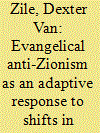

|
|
|
|
|
| Publication |
2013.
|
| Summary/Abstract |
Since the founding of the Jewish state in 1948, Evangelical Protestants in the United States have been regarded-with good reason-as Israel's most reliable supporters. In 2008, Jody C. Baumgartner and a number of other researchers reported that Evangelicals are "more likely than other Americans to have sympathy for Israel in its dispute with the Palestinians and to agree that the United States should take Israel's side more often in the Middle East."1 More recently, a poll conducted by the Pew Charitable Trust indicated that Evangelicals are more likely than other American Jews to believe that God gave the land to the Jewish people.2 In addition to the belief that God's promises endure forever, much Evangelical support for Israel is motivated by an understanding of the religious component of Arab hostility toward Israel. Evangelicals, Baumgartner and her colleagues reported, are "significantly more likely than other Americans to agree that Islam is a more violent religion than Christianity, Judaism, or Hinduism."3 Other factors related to Evangelical support for Israel include an adherence to premillenial dispensationalism (an eschatology that posits that the return of the Jews to their homeland is a precursor to the return of Jesus Christ),4 gratitude to the Jewish people for their scriptures, and remorse over the Holocaust.5
|
|
|
|
|
|
|
|
|
|
|
|
|
|
|
|
| 4 |
ID:
127338
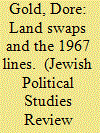

|
|
|
|
|
| Publication |
2014.
|
| Summary/Abstract |
When President Barak Obama made his first public reference to the 1967 lines as the basis for future Israeli-Palestinian negotiations on May 19, 2011, he introduced one main caveat: the idea that there would be "mutually agreed swaps" of land between the two sides. He added that both sides were entitled to "secure and recognized borders." But the inclusion of land swaps also raised many questions.
Where did the idea of land swaps come from? True, they have been part of the Israeli discourse among peace process experts for years, but were they legally required? To what extent do land swaps protect Israel's rights to "secure borders" in the event the 1967 lines are used as the territorial basis of a peace settlement?
Several months after Israel captured the West Bank and Gaza in the 1967 Six Day War, the U.N. Security Council defined the territorial terms of a future peace settlement in Resolution 242, which over the decades became the cornerstone for all Arab-Israeli diplomacy. At the time, the Soviets had tried to brand Israel as the aggressor in the war and force on it a full withdrawal, but Resolution 242 made clear that Israel was not expected to withdraw from all the territories that came into its possession, meaning that Israel was not required to withdraw from 100 percent of the West Bank.
|
|
|
|
|
|
|
|
|
|
|
|
|
|
|
|
| 5 |
ID:
127332
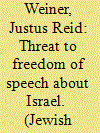

|
|
|
|
|
| Publication |
2013.
|
| Summary/Abstract |
On February 8, 2010, Michael Oren, Israel's ambassador to the United States, began speaking to a packed hall at UC Urvine. Moments into his remarks, Oren was loudly interrupted by a group of students that spent the remainder of his talk hurling crude and unsubstantiated accusations at him. The disrupters delayed Oren's speech by nearly an hour, significantly foreshortened his remarks, and almost prevented the audience from hearing him at all. Faculty pleas for restraint were ignored. Both the university and the state of California responded vigorously. University administrators suspended individual student disrupters and the organization to which they belonged while the local District Attorney charged, and successfully convicted, the hecklers for interfering with a public meeting. Both the activists' behavior and the response of the authorities have drawn severe criticism from observers, and all sides present themselves as the genuine defenders of free speech and First Amendment principles. - See more at: http://jcpa.org/article/the-threat-to-freedom-of-speech-about-israel/#sthash.MHHuCtpj.dpuf
|
|
|
|
|
|
|
|
|
|
|
|
|
|
|
|
|
|
|
|
|